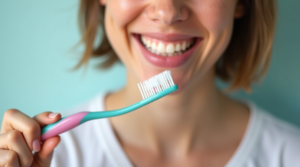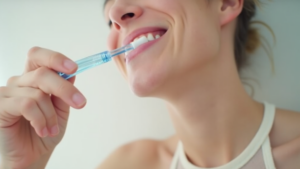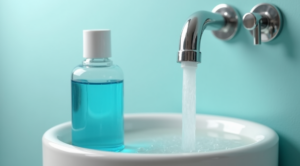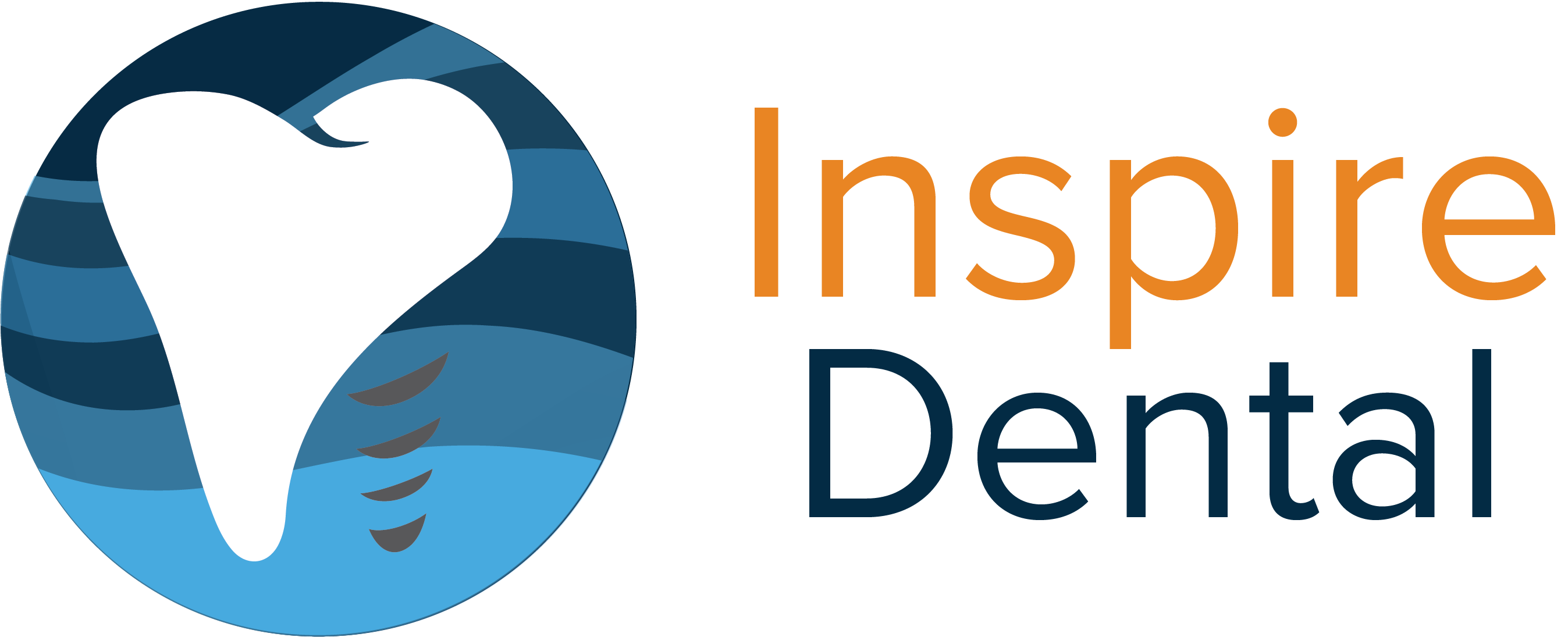Maintaining good oral hygiene at home is essential for a healthy smile and overall well-being. By following these easy-to-implement tips, you can improve your dental health and prevent common oral problems.
Key takeaways:
- Brush twice daily with fluoride toothpaste
- Floss once a day to remove plaque between teeth
- Use an antiseptic mouthwash to kill bacteria
- Replace your toothbrush every 3-4 months
- Limit sugary and acidic foods and drinks
- Drink plenty of water throughout the day
- Eat crunchy fruits and vegetables to clean your teeth
- Avoid using teeth as tools to open packages
- Quit smoking to improve oral health
- Schedule regular dental check-ups and cleanings
The Importance of At-home Oral Care Tips

Good oral hygiene starts with At-home oral care tips While regular dental visits are crucial, your daily habits play a significant role in maintaining healthy teeth and gums. By implementing a consistent oral care routine, you can prevent cavities, gum disease, and other dental issues that may require costly treatments down the line.
Brush Smarter, Not Harder

Brushing your teeth is the foundation of good oral hygiene. However, many people don’t brush correctly or long enough. Here are some tips to improve your brushing technique:
Use the right toothbrush
Choose a soft-bristled toothbrush that fits comfortably in your mouth. Hard bristles can damage your tooth enamel and irritate your gums. Electric toothbrushes can be more effective at removing plaque, but a manual toothbrush works well too if used correctly.
Brush for two minutes
Set a timer or use an electric toothbrush with a built-in timer to ensure you brush for a full two minutes. Many people underestimate how long they brush, so timing yourself can be eye-opening.
Use proper technique
Hold your toothbrush at a 45-degree angle to your gums and use gentle, circular motions. Avoid scrubbing back and forth, as this can damage your gums and tooth enamel. Don’t forget to brush the outer, inner, and chewing surfaces of all your teeth.
Don’t forget your tongue
Bacteria can accumulate on your tongue, causing bad breath and other oral health issues. Gently brush your tongue or use a tongue scraper to remove bacteria and freshen your breath.
Flossing: The Unsung Hero of Oral Care

Flossing is often overlooked, but it’s just as important as brushing. Floss removes plaque and food particles from between your teeth and along the gum line that your toothbrush can’t reach.
Choose the right floss
There are many types of floss available, including waxed, unwaxed, flavored, and tape. Experiment to find the one that works best for you. If traditional floss is difficult to use, try floss picks or a water flosser.
Floss at least once a day
Make flossing a daily habit, preferably before bedtime. This removes the day’s buildup of plaque and food particles, giving your mouth a clean slate for the night.
Use proper flossing technique
Use about 18 inches of floss, winding most of it around your middle fingers. Gently guide the floss between your teeth using a rubbing motion. When the floss reaches your gums, curve it into a C shape against one tooth and slide it gently into the space between the gum and the tooth.
Rinse for Extra Protection: Antiseptic Mouthwash

Using an antiseptic mouthwash can help kill bacteria and freshen your breath. Look for a mouthwash that contains fluoride to help strengthen your tooth enamel.
Choose the right mouthwash
There are many types of mouthwash available, including those for cavity protection, gum health, and whitening. Choose one that addresses your specific oral health needs.
Use mouthwash correctly
Swish the mouthwash around in your mouth for at least 30 seconds before spitting it out. Avoid eating or drinking for at least 30 minutes after using mouthwash to allow the active ingredients to work.
Maintain your at-home oral care tips routine with the right tools
Your toothbrush and other oral care tools need regular maintenance to remain effective.
Replace your toothbrush regularly
Replace your toothbrush or electric toothbrush head every 3-4 months, or sooner if the bristles become frayed. A worn-out toothbrush is less effective at removing plaque and can harbor bacteria.
Clean your tongue scraper
If you use a tongue scraper, rinse it thoroughly with hot water after each use and allow it to air dry.
Store your tools properly
Keep your toothbrush and other oral care tools in a clean, dry place. Avoid storing them in closed containers, which can promote bacterial growth.
Watch what you eat and drink
Your diet plays a significant role in your oral health. Here are some tips to protect your teeth through your food and drink choices:
Limit sugary and acidic foods
Sugar and acid can erode your tooth enamel and lead to cavities. Limit your intake of sugary snacks, sodas, and fruit juices. When you do consume them, rinse your mouth with water afterward.
Drink plenty of water
Water helps wash away food particles and bacteria, and it also helps maintain a healthy pH balance in your mouth. Aim to drink at least 8 glasses of water a day.
Eat crunchy fruits and vegetables
Crunchy fruits and vegetables like apples, carrots, and celery can help clean your teeth naturally. They stimulate saliva production, which helps neutralize acids and wash away food particles.
Chew sugar-free gum
Chewing sugar-free gum after meals can stimulate saliva production, which helps neutralize acids and wash away food particles. Look for gum with xylitol, which has been shown to reduce cavity-causing bacteria.
Protect your Teeth from Damage
Your teeth are strong, but they’re not indestructible. Here are some tips to protect them from damage:
Don’t use your teeth as tools
Avoid using your teeth to open packages, crack nuts, or remove bottle caps. This can chip or crack your teeth.
Wear a mouthguard during sports
If you play contact sports or grind your teeth at night, wear a properly fitted mouthguard to protect your teeth from injury.
Address teeth grinding
If you grind your teeth at night, talk to your dentist about getting a custom night guard. Teeth grinding can wear down your enamel and cause jaw pain.
Quit Smoking for Better Oral Health
Smoking is not only bad for your overall health, but it’s also detrimental to your oral health. Smoking can lead to gum disease, tooth discoloration, and oral cancer. If you smoke, consider quitting for the sake of your oral and overall health.
Schedule Regular Dental Check-ups
Even with excellent at-home care, regular dental check-ups and cleanings are essential. Your dentist can spot potential problems early and provide professional cleanings to remove tartar buildup.
Visit your dentist twice a year
Most people should see their dentist every six months for a check-up and cleaning. If you have specific oral health issues, your dentist may recommend more frequent visits.
Don’t skip dental X-rays
Dental X-rays allow your dentist to see problems that aren’t visible to the naked eye, such as decay between teeth or issues below the gum line.
The Role of Genetics in Oral Health
While good oral hygiene habits are crucial, it’s important to understand that genetics can also play a role in your oral health.
Genetic Factors Affecting Oral Health
Some people may be more prone to cavities or gum disease due to genetic factors. This doesn’t mean you’re doomed to poor oral health, but it does mean you may need to be extra vigilant with your oral care routine.
Talk to your dentist about your family history
Discuss your family’s oral health history with your dentist. This information can help them identify potential risk factors and develop a personalized prevention plan.
The Connection Between Oral Health and Overall Health
Your oral health is closely linked to your overall health. Poor oral hygiene has been linked to various health issues, including heart disease, diabetes, and respiratory infections.
How oral health affects your body
Bacteria from gum disease can enter your bloodstream and travel to other parts of your body, potentially causing inflammation and other health problems.
The importance of a holistic approach
Maintaining good oral health should be part of your overall health strategy. A healthy diet, regular exercise, and stress management can all contribute to better oral health.
At-home Oral Care Tips for Different Life Stages
Your oral care needs may change throughout your life. Here are some considerations for different age groups:
Children’s oral care
Start good oral hygiene habits early. Help your children brush and floss until they can do it effectively on their own, usually around age 7 or 8.
Oral care during pregnancy
Hormonal changes during pregnancy can increase the risk of gum disease. Pregnant women should pay extra attention to their oral hygiene and see their dentist regularly.
Oral care for seniors
As you age, you may face new oral health challenges, such as dry mouth or increased risk of gum disease. Talk to your dentist about adjusting your oral care routine to address these issues.
Natural remedies for oral health
While not a substitute for regular brushing, flossing, and dental visits, some natural remedies may support oral health:
Oil pulling
This ancient practice involves swishing oil (usually coconut oil) in your mouth for 15-20 minutes. Some people believe it can help reduce bacteria and improve oral health.
Herbal mouthwashes
Some herbs, such as sage and peppermint, have antimicrobial properties and may help freshen breath when used as a mouthwash.
Green tea
Green tea contains compounds that may help reduce inflammation and fight bacteria in the mouth.
The Future of At-home Oral Care
Advances in technology are changing the landscape of at-home oral care:
Smart toothbrushes
These toothbrushes connect to your smartphone and provide real-time feedback on your brushing technique and habits.
At-home oral care tips monitoring
Some companies are developing at-home devices that allow you to monitor your oral health and share data with your dentist between visits.
Personalized oral care products
As we learn more about the oral microbiome, we may see more personalized oral care products tailored to individual needs.
| Oral Care Product | Recommended Replacement Frequency | Why It’s Important |
|---|---|---|
| Toothbrush | Every 3-4 months | Worn bristles are less effective and can harbor bacteria |
| Floss | N/A (single use) | Fresh floss ensures effective plaque removal |
| Mouthwash | Check expiration date | Expired mouthwash may lose its effectiveness |
| Tongue scraper | Every 3-4 months | Worn scrapers may not clean effectively |
| Food/Drink | Effect on Oral Health | Alternative |
|---|---|---|
| Soda | Erodes enamel, high in sugar | Sparkling water with natural flavors |
| Candy | Promotes tooth decay | Sugar-free gum with xylitol |
| Coffee | Can stain teeth | Green tea (in moderation) |
| Citrus fruits | Acidic, can erode enamel | Eat with meals, rinse mouth after |
- Tips for making oral care a habit:
- Set reminders on your phone for brushing and flossing
- Keep floss in visible, easily accessible places
- Reward yourself for maintaining good oral hygiene habits
- Use a habit-tracking app to monitor your progress
- Make it a family activity to encourage children
By incorporating these at-home oral care tips into your daily routine, you can significantly improve your oral health and maintain a beautiful, healthy smile. Remember, consistency is key when it comes to oral hygiene. Make these habits a part of your daily life, and your teeth and gums will thank you for years to come.
Don’t wait until your next dental appointment to take charge of your oral health! Start with these simple at-home oral care tips: brush twice a day with fluoride toothpaste, floss daily, and rinse with mouthwash to keep your smile bright and healthy. Remember, good oral hygiene starts at home—make it a priority and enjoy fresher breath, healthier gums, and a more confident smile. Commit to your oral health today
